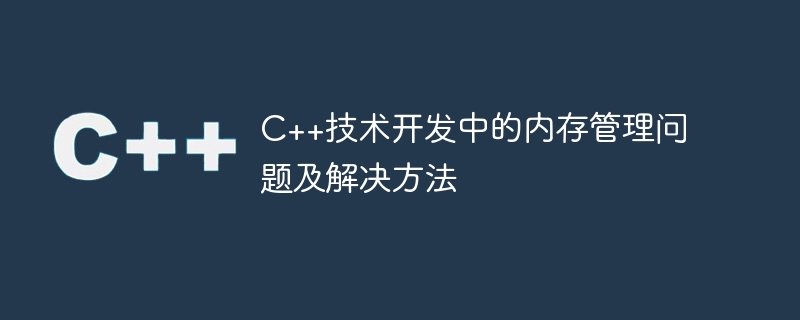Home >Backend Development >C++ >Memory management issues and solutions in C++ technology development
Memory management issues and solutions in C++ technology development
- WBOYWBOYWBOYWBOYWBOYWBOYWBOYWBOYWBOYWBOYWBOYWBOYWBOriginal
- 2023-10-11 08:10:511213browse

Memory management issues and solutions in C technology development
In C development, memory management is a key issue. Improper memory management may lead to serious consequences such as memory leaks, wild pointer access, and memory overflow. This article discusses some common memory management problems and provides corresponding solutions and sample code.
- Memory leak
Memory leak means that after the program allocates memory, it does not release the memory at the appropriate time, resulting in the memory being unable to be used again. A memory leak will cause the program's memory consumption to continue to increase, eventually causing the program to crash. The way to solve the memory leak is to release the dynamically allocated memory in the appropriate place each time.
Sample code:
void func() {
int* p = new int;
// do something
delete p; //在不再需要指针 p 的时候释放内存
}- Wild pointer access
Wild pointer refers to the situation where the pointer variable has not been initialized or has been released, and continues to access the pointer. The memory area pointed to. Wild pointer access may cause the program to crash or produce unpredictable results. In order to avoid wild pointer access, you can perform a legality check or set the pointer to null before each use.
Sample code:
void func() {
int* p = nullptr; // 初始化指针为空
// do something
if (p != nullptr) { // 检查指针合法性
*p = 10; // 访问指针所指向的内存
// more code
}
}- Memory overflow
Memory overflow means that the memory allocated by the program exceeds the range of available memory. When the memory requested by a program exceeds the system limit, the operating system will terminate the program. In order to avoid memory overflow, dynamic memory allocation can be used to apply for and release memory according to actual needs, and utilize memory resources flexibly.
Sample code:
void func() {
int* p = new int[1000]; // 动态分配一块内存
// do something
delete[] p; // 释放内存
}- Pointer reference dangling
A pointer reference dangling means that when the object pointed to by the pointer is destroyed, the pointer still retains its original address. Before using a pointer, a legality check should be performed to ensure that the object referenced by the pointer is valid.
Sample code:
void func() {
int* p = new int;
int* q = p;
delete p; // 销毁 p 所指向的对象
p = nullptr; // 将 p 设置为空
// 使用 p 前需要进行检查
if (p != nullptr) {
// do something
}
// 使用 q 时需要注意,它仍然引用了一个无效的内存地址
}In order to better manage memory, C provides some important tools and technologies, such as smart pointers (Smart Pointer), RAII (resource acquisition is initialization) )wait. Smart pointers can help developers automatically manage memory application and release, avoiding manual negligence and errors. The RAII principle refers to obtaining resources when the object is constructed and releasing the resources when the object is destroyed, thereby ensuring the correct release of resources.
Summary:
In C technology development, memory management is a crucial issue. Proper memory management can improve the stability and reliability of your code and avoid serious consequences. In order to solve memory management problems, developers should develop good programming habits, promptly release memory that is no longer needed, avoid wild pointer accesses and memory overflows, and use tools and techniques reasonably to help with memory management.
The above is the detailed content of Memory management issues and solutions in C++ technology development. For more information, please follow other related articles on the PHP Chinese website!

